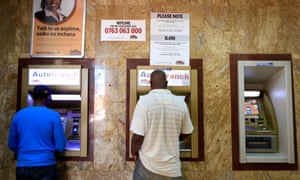Universal basic income doesn’t work. Let’s boost the public realm instead
A study of UBI trials concludes that making cash payments to all is no solution to poverty and inequality
• Anna Coote is co-author of Universal Basic Income: A Union Perspective
• Anna Coote is co-author of Universal Basic Income: A Union Perspective
A study published this week sheds doubt on ambitious claims made for universal basic income (UBI), the scheme that would give everyone regular, unconditional cash payments that are enough to live on. Its advocates claimit would help to reduce poverty, narrow inequalities and tackle the effects of automation on jobs and income. Research conducted for Public Services International, a global trade union federation, reviewed for the first time 16 practical projects that have tested different ways of distributing regular cash payments to individuals across a range of poor, middle-income and rich countries, as well as copious literature on the topic.
It could find no evidence to suggest that such a scheme could be sustained for all individuals in any country in the short, medium or longer term – or that this approach could achieve lasting improvements in wellbeing or equality. The research confirms the importance of generous, non-stigmatising income support, but everything turns on how much money is paid, under what conditions and with what consequences for the welfare system as a whole.
From Kenya and southern India to Alaska and Finland, cash payment schemes have been claimed to show that UBI “works”. In fact, what’s been tested in practice is almost infinitely varied, with cash paid at different levels and intervals, usually well below the poverty line and mainly to individuals selected because they are severely disadvantaged, with funds provided by charities, corporations and development agencies more often than by governments.
Experiments in India and Kenya have been funded, respectively, by Unicefand Give Directly, a US charity supported by Google. They give money to people on very low incomes in selected villages for fixed periods of time. Giving small amounts of cash to people who have next to nothing is bound to make a difference – and indeed, these schemes have helped to improve recipients’ health and livelihoods. But nothing is revealed about their longer-term viability, or how they could be scaled up to serve whole populations. And there is a democratic deficit: people who get their basic income from charities or aid agencies have no control over how payments are made, to whom, at what level or over what period of time.
The Alaska Permanent Fund, built from the state’s oil revenues, pays all adults and children a dividend each year – in 2018, it was $1,600 (£1,230). The scheme is popular and enduring; it has been found to produce some positive impacts on rural indigenous groups, but it makes no claim to sufficiency and has done nothing to reduce child poverty or to prevent widening income inequalities.


No comments:
Post a Comment